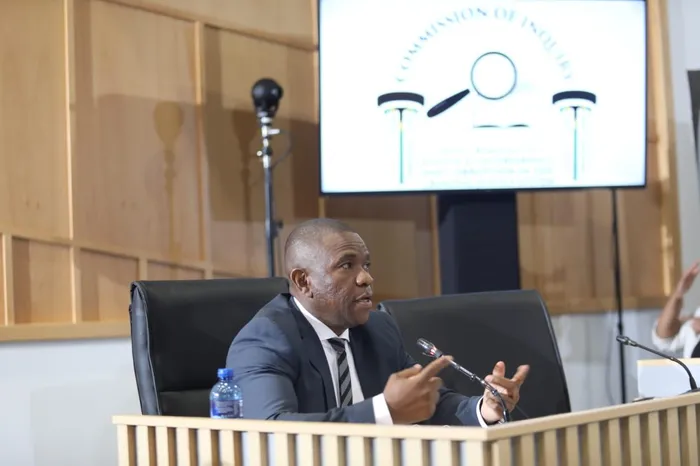
KwaZulu-Natal SAPS Commissioner Lieutenant-General Nhlanhla Mkhwanazi took centre stage as the first witness to testify at the Madlanga Commission of Inquiry.
Image: Oupa Mokoena / Independent Newspapers
The Minister of Police, Senzo Mchunu, faced criticism on the first day of the Madlanga Judicial Commission of Inquiry for ordering the disbandment of the political killings task team and halting the filling of crime intelligence posts, effective January 2, 2025.
KwaZulu-Natal SAPS Commissioner Lieutenant-General Nhlanhla Mkhwanazi, who is the first witness to testify, told the commission on Wednesday that Mchunu's decision was “misplaced”.
The commission, established by President Cyril Ramaphosa, is probing allegations of corruption, political interference, and infiltration by criminal syndicates within South Africa's law enforcement and intelligence agencies.
This followed Mkhwanazi's explosive public statements on July 6, during a media briefing, alleging political interference in the criminal justice system.
It came to light that a letter penned by Mchunu dated January 2, 2025, pointed out that the task team was not adding value to the policing work.
Mkhwanazi said: “The minister’s conclusion that the team does not add any value to policing in South Africa was misplaced."
He stated that whoever advised Mchunu to disband the political killings task team likely did so because they mistakenly believed the team was responsible for investigating organised crime in Gauteng, which involved senior police officers, politicians, and their associates.
According to him, the minister's letter interfered with the operational work of the SAPS, which fell outside the minister's policy-making and directive role.
Mkhwanazi said the filling of crime intelligence posts was the responsibility of the divisional commissioner and the national SAPS commissioner, not the minister.
“The impact of this is severe. We have already been trying to put some reforms within crime intelligence in order to respond to the growing crime level in the country,” he said.
The commission will scrutinise 121 dockets related to political murders in KwaZulu-Natal, involving councillors, office bearers, and traditional leaders.
Although the commission has received copies of the dockets, the original files will remain with the KwaZulu-Natal political killings task team.
Mkhwanazi's testimony highlighted the murder of Vereeniging engineer Armand Swart, who was shot outside his workplace on April 17, 2024.
The murder exposed an alleged corruption scandal linked to multimillion-rand Transnet contracts, implicating organised crime elements, police officers, and a magistrate.
Following the shooting, three suspects were arrested, including a police officer, Michael Pule Tau, along with Musa Kekana and Floyd Mabusela. They faced charges of murder, attempted murder, conspiracy, possession of stolen property, and possession of an unlicensed firearm and ammunition.
Mkhwanazi said the investigation team faced significant challenges, including threats to their lives and allegations of bribery against the magistrate.
“Through forensic analysis, those firearms were linked with multiple other murders, other than the one that (of) Mr Swart,” Mkhwanazi said.
He said a forensic investigation revealed the accused's involvement in broader incidents, with significant financial backing, and substantial payments made for their services.
According to him, Tau was later granted R10,000 bail, citing health reasons, after the SAPS' opposition to his bail was unsuccessful.
“This sparked great concern among the investigators; they started fearing for their lives, and threats to their lives started escalating. The threats were coming verbally and others physically; others were being followed around,” he said.
He testified that a senior National Prosecuting Authority prosecutor expressed concerns about threats faced by the investigating team and the accused in the Swart murder case, and requested protection for two team members.
Mkhwanazi referred to the prosecutor's letter, which stated that the investigation into Swart's murder revealed a link to a whistle-blowing on a Transnet hotline about corrupt activities worth millions of rand.
He stated that the firearm used in the assassination and found in the suspects' possession was linked to multiple assassinations and serious violent crimes.
Additionally, cellphone data revealed connections to high-profile organised crime and meticulous crime scene planning.
“The investigation has proved that all three accused are involved in a serious organised crime incident, of which a million rand was offered for the assassination in this regard,” Mkhwanazi said.
The prosecutor's letter noted that the magistrate, for some bizarre and unexplainable reason, decided to grant Tau bail of R10,000 and place him under house arrest.
Advocate Mahlape Sello SC, leading Mkhwanazi's evidence, stated that she could not identify potential witnesses to corroborate Mkhwanazi's information at that time.
“The witness makes the point that the bulk of information that informs the commission relies on ongoing investigation and, therefore, that would not be discussed publicly as that would adversely affect the investigation,” she said.
Sello said Mkhwanazi assured the commission that full disclosure of all relevant facts would be made during a subsequent in-camera session, where a corroborating witness would also testify.
The commission will continue to investigate these allegations, with Mkhwanazi's testimony set to resume on Thursday.
rapula.moatshe@inl.co.za